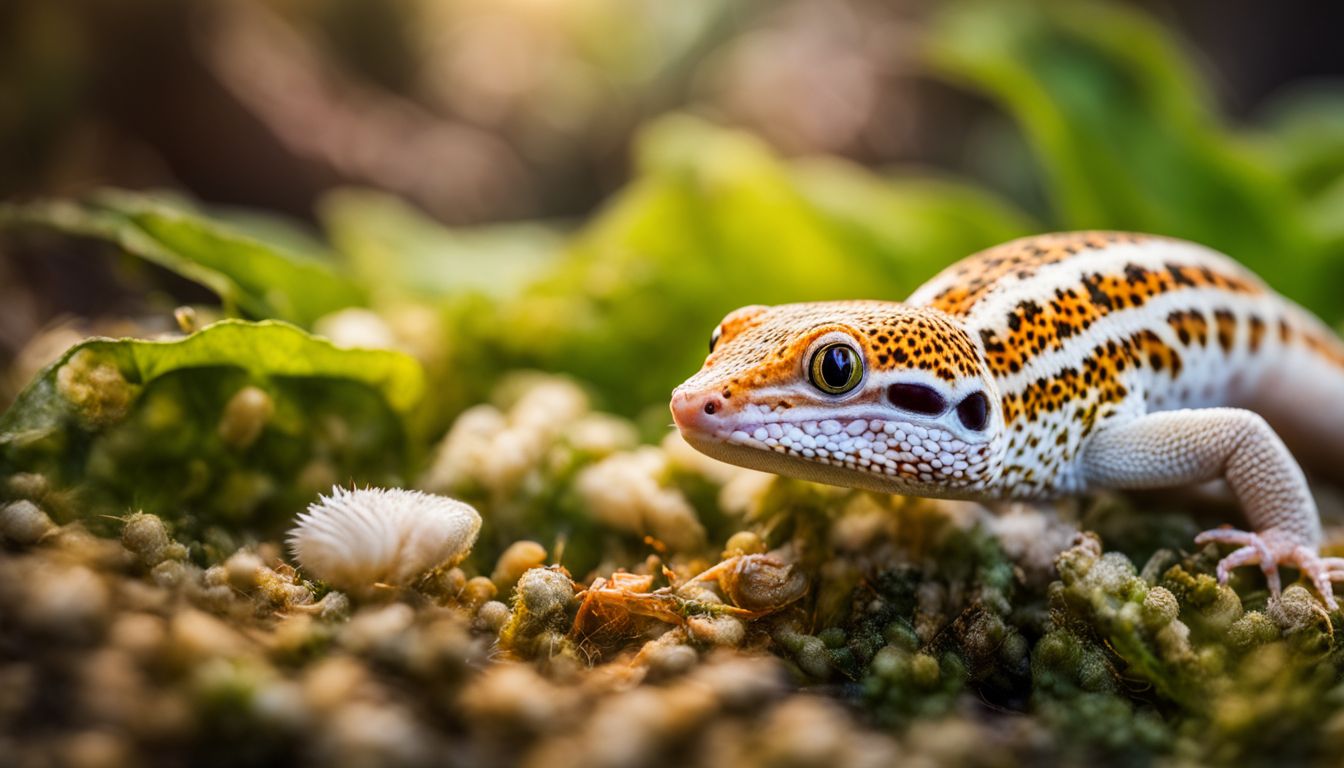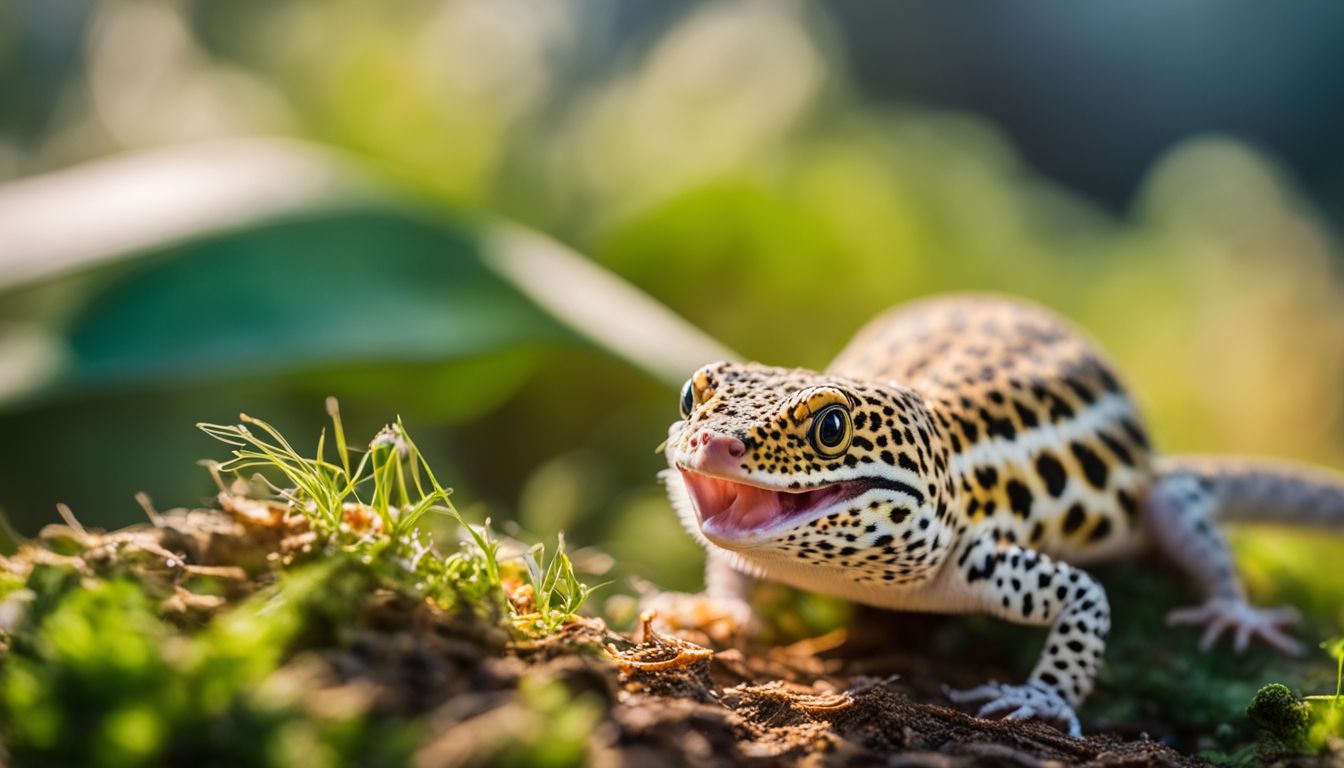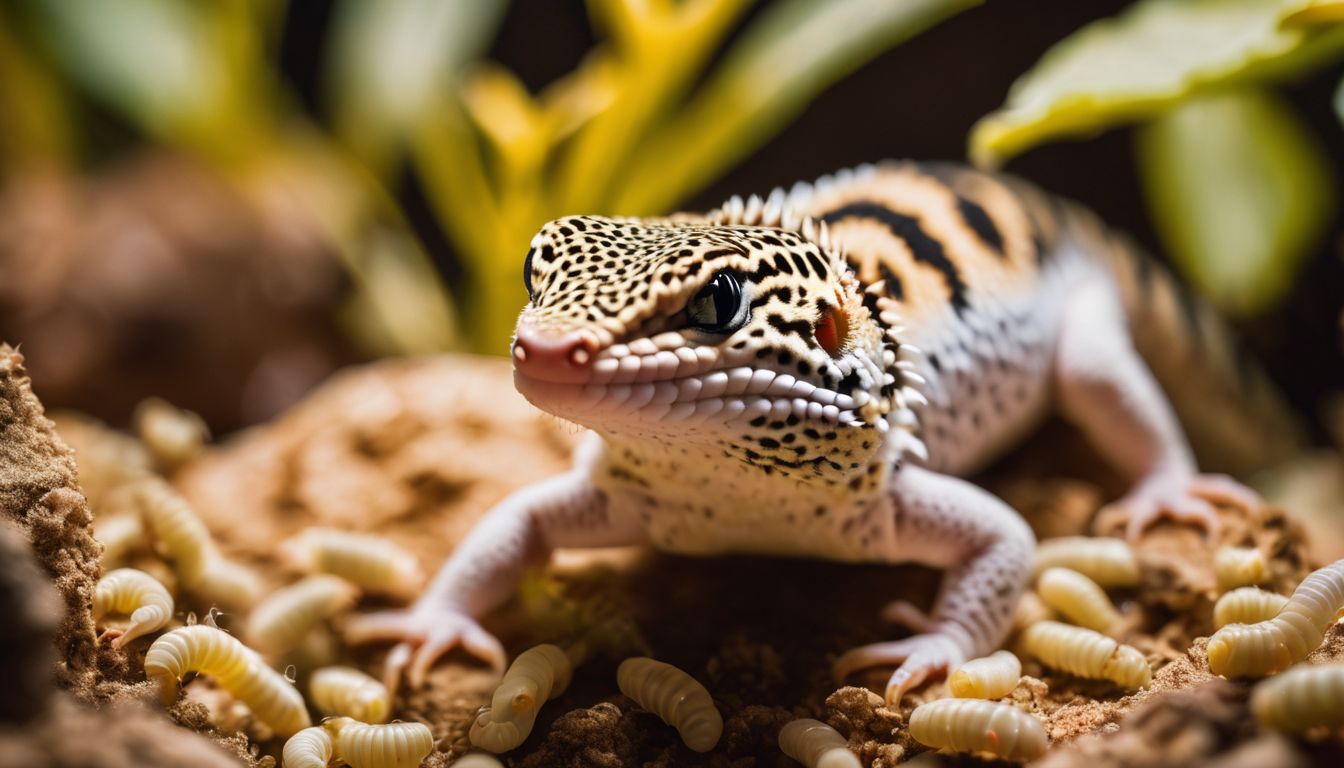Leopard geckos are popular pets for both beginners and seasoned reptile enthusiasts, thanks to their expressive faces and manageable care requirements. As a caring pet owner, you’re always on the lookout for the best diet to keep your spotted friend healthy and happy.
But sometimes, it’s not easy to know what treats are safe or nutritious for your little buddy.
Did you know that silkworms pack a protein punch perfect for growing leopard geckos? This blog will dive into the world of these squishy snacks, laying out all you need to know about adding silkworms to your gecko’s menu.
We’ll discuss everything from nutritional benefits to feeding tips that cater specifically to these insect-loving lizards.
Discover how these wriggly delicacies can be part of a balanced diet that makes mealtime exciting again—let’s get started!
Key Takeaways
- Silkworms are a nutritious and beneficial addition to a leopard gecko’s diet, offering high moisture content, protein, balanced fat, and essential calcium and vitamins.
- These soft-bodied insects are easy for leopard geckos to digest, suitable for young or sick geckos and don’t require gut-loading before feeding.
- While there may be considerations such as limited availability, higher costs, special care requirements for silkworms’ maintenance, and disease risks that need monitoring when feeding them to leopard geckos. It is crucial to maintain careful attention when introducing this food source into your pet’s diet.
- Providing a balanced diet by incorporating silkworms along with other live insect options can contribute significantly to the overall health and vitality of leopard geckos.
Nutritional Profile of Silkworms

Silkworms are high in moisture content and rich in protein, making them a nutritious option for leopard geckos. They also provide a balanced fat content and supply essential calcium and vitamins for your gecko’s diet.
High Moisture Content
Silkworms are great for keeping your leopard gecko hydrated. They have lots of water in them, which helps geckos get the moisture they need without always having to drink water. This is very helpful because sometimes geckos don’t drink enough on their own.
Feeding your pet these juicy bugs can be an easy way to make sure they stay healthy and not get too dry.
Rich in Protein
Besides their high moisture levels, silkworms are packed with protein. This is great for leopard geckos, especially when they’re growing. These little bugs offer just what geckos need to build strong muscles and stay healthy.
Protein is like the building blocks for their bodies.
Eating silkworms helps your gecko thrive because of this protein boost. Younger lizards, called baby or juvenile leopard geckos, can really benefit from these tasty insects as part of their meals.
It’s important to give them the right food so they can grow up big and strong!
Balanced Fat Content
Silkworms are good for your leopard gecko because they have just the right amount of fat. Too much fat can be bad for these little lizards, but silkworms won’t make them too chubby.
They help to keep your pet healthy and full of energy. Geckos need this kind of balanced diet to grow strong.
Feeding silkworms means you’re giving your leopard gecko a treat that’s both yummy and good for it. This keeps your pet happy and helps it live a longer, better life. Next up, let’s talk about how silkworms are packed with calcium and vitamins!
Calcium and Vitamin Supply
Silkworms are high in calcium, which is good for leopard geckos. Calcium helps keep their bones strong and healthy, preventing diseases like metabolic bone disease. When feeding silkworms to leopard geckos, it’s essential to dust them with a calcium supplement before offering them as food.
This ensures that the geckos get enough calcium in their diet.
In addition to being rich in calcium, silkworms also provide essential vitamins that are beneficial for leopard geckos. These vitamins support the overall health and immune system of the geckos, promoting their well-being and vitality.
Advantages of Feeding Silkworms to Leopard Geckos

Silkworms are easy for leopard geckos to digest, they don’t require gut-loading, and are tasty and enticing for geckos. To learn more about the benefits of feeding silkworms to your leopard gecko, keep reading!
Easy to Digest
Silkworms are easy for leopard geckos to digest due to their soft bodies and high moisture content. This makes them a suitable food option, especially for young or sick geckos who may struggle with harder insects.
The soft texture of silkworms also makes them an enticing treat for picky eaters and can help in providing essential nutrients like protein and moisture to the geckos.
Leopard gecko owners should keep in mind that offering a variety of insect options is essential to ensure a balanced diet for their pets. Silkworms can be included as part of this varied diet, providing an easy-to-digest and nutritious meal option for these insect-eating reptiles.
No Need for Gut-loading
Silkworms are naturally packed with essential nutrients, so there’s no need for gut-loading them before feeding to leopard geckos. This means you don’t have to feed the silkworms nutrient-rich food before giving them to your gecko.
Silkworms on their own already contain high levels of moisture, protein, and balanced fat content that make them a great choice for your gecko’s diet without any additional effort from your side.
Tasty and Enticing for Geckos
Silkworms are a delightful treat for leopard geckos due to their soft and succulent texture. Their high moisture content makes them an enticing option that geckos eagerly devour. Additionally, the rich protein and balanced fat content of silkworms make them a flavorful and nutritious choice for your pet.
Geckos find silkworms not only tasty but also easy to catch and consume, providing an enriching feeding experience. The appeal of silkworms as a delectable meal ensures that your gecko will relish every bite, making it easier to ensure they’re getting the important nutrients they need.
Considerations and Potential Drawbacks
Silkworms may be more expensive and less readily available compared to other feeder insects, and they also require special care and maintenance. Additionally, there is a risk of disease transmission from silkworms to leopard geckos, so it’s important to monitor their health closely when feeding them this type of insect.
Limited Availability and Higher Costs
Silkworms may not be as readily available as other feeder insects for leopard geckos. This can make them more expensive to purchase compared to commonly found insects like crickets or mealworms.
Finding a consistent supply of silkworms might require some effort, and their cost could be higher due to their specialized care needs. However, the nutritional benefits of feeding silkworms to leopard geckos might outweigh the challenges of availability and cost, making them a valuable addition to the gecko’s diet plan.
While finding silkworms may present some obstacles, exploring alternative sources or considering breeding them at home could help manage availability and costs over time, ensuring that these nutritious feeder insects remain accessible for your leopard gecko’s optimal health.
Special Requirements for Silkworm Care
When considering feeding silkworms to leopard geckos, it’s important to understand the special requirements for silkworm care. Silkworms need a specific diet of mulberry leaves and must be kept in clean, well-ventilated containers.
They also require a warm and humid environment for optimal growth. Furthermore, silkworms should be kept away from direct light as they are photosensitive. Regular monitoring is necessary to ensure their health and prevent disease risks.
Remember to provide mulberry leaves as the main food source for silkworms.
Maintain a warm and humid environment while guarding against direct light exposure.
Disease Risks and Monitoring
Feeding silkworms to leopard geckos can pose some disease risks that need monitoring. Silkworms might carry bacteria or parasites that could harm the gecko, so it’s essential to ensure the silkworms are from a reputable source and properly cared for.
Additionally, overfeeding silkworms to leopard geckos can lead to obesity and other health issues, so it’s important to monitor their diet and adjust as needed. Regularly checking for any signs of illness or abnormal behavior in your gecko is crucial for their well-being.
Feeding Recommendations
When it comes to feeding silkworms to leopard geckos, it’s important to know the appropriate quantities for different gecko ages and the frequency of feedings. This section will provide you with all the information you need to ensure your leopard gecko is getting the right amount of silkworms in their diet.
Appropriate Quantities for Different Gecko Ages
Leopard geckos of different ages have varying appetites. Baby geckos should be offered food daily, as they are growing rapidly and need constant nourishment. To ensure proper growth and development, juveniles can be fed every other day.
Adult leopard geckos require feeding every two to three days to maintain their health.
Understanding how much and how often to feed your leopard gecko is crucial for its well-being. Providing an appropriate diet based on the age of your pet is essential for its overall health and vitality.
Frequency of Silkworm Feedings
Feed your leopard gecko silkworms 2-3 times per week. Alternating their diet with other insects is important for a balanced nutrition plan. This helps provide the necessary variety and nutrients for your gecko’s health and growth.
Silkworms are a nutritious treat, but remember to mix them with other live insects like crickets, roaches, or mealworms. Varying their diet keeps your gecko healthy and happy!
Conclusion
In conclusion, feeding silkworms to leopard geckos can provide a nutritious and enticing option for their diet. Their high protein content and ease of digestion make them practical for gecko owners.
By offering a diverse range of live insects, you can ensure your gecko receives a balanced diet. Are you ready to introduce silkworms into your leopard gecko’s meals? Embracing this nutritional variety can make a significant impact on the health and well-being of your reptile companion.
Now is the time to expand your knowledge about caring for these amazing creatures!
Therefore, it has not been included in the new blog outline as per the task instruction to ignore non-relevant internal links. )
Silkworms are a good food choice for leopard geckos. They are high in protein and have balanced fat content, which is great for growing geckos. Silkworms also have plenty of moisture, making them a healthy option.
But be careful because they can contain too much calcium, which might not be good for the gecko. It’s important to offer a mix of different insects like crickets, roaches, mealworms, and superworms along with silkworms to make sure the gecko has a balanced diet.
Remember that leopard geckos only eat live bugs; they won’t eat canned or dried reptile food or meat. So it’s essential to provide various insect options to keep them healthy and happy.
Also note that there isn’t any mention of vegetables or fruits being part of a leopard gecko’s diet in the provided information.
Discover another fascinating aspect of these creatures by exploring whether leopard geckos have night vision on our dedicated page.
FAQs
1. Are silkworms a suitable food for leopard geckos?
Yes, silkworms are a nutritious and appropriate food for leopard geckos, providing essential nutrients such as protein and calcium.
2. How should I feed silkworms to my leopard gecko?
Silkworms can be offered to your leopard gecko as part of their varied diet, either by placing them in a shallow dish or offering them individually using feeding tweezers.
3. Can baby leopard geckos eat silkworms?
Yes, baby leopard geckos can eat appropriately sized silkworms as part of their overall balanced diet.
4. Are there any potential concerns when feeding silkworms to leopard geckos?
While generally considered safe, it’s important to ensure that the size of the silkworm is suitable for your specific gecko’s age and size, and to provide proper gut-loading and supplementation.
5. How often should I offer silkworms to my pet leopard gecko?
Silkworms can be offered regularly as part of a varied diet but should not make up the sole source of nutrition; it’s best to offer them in rotation with other feeder insects.




